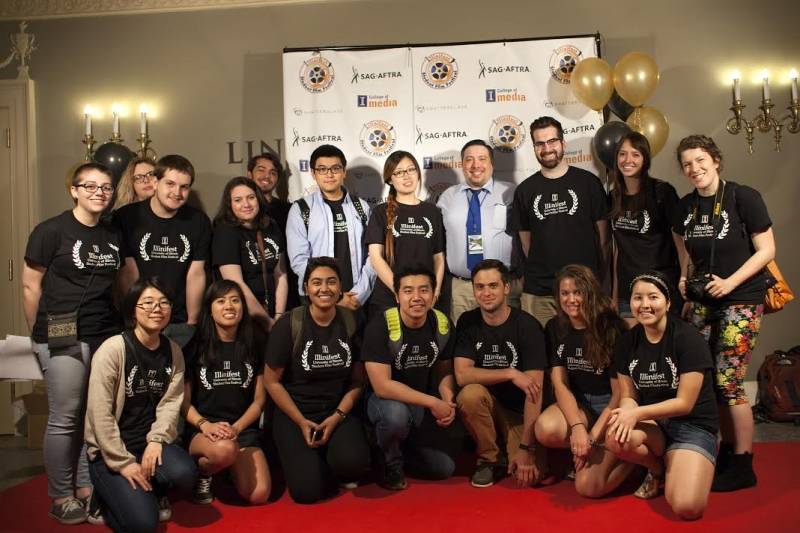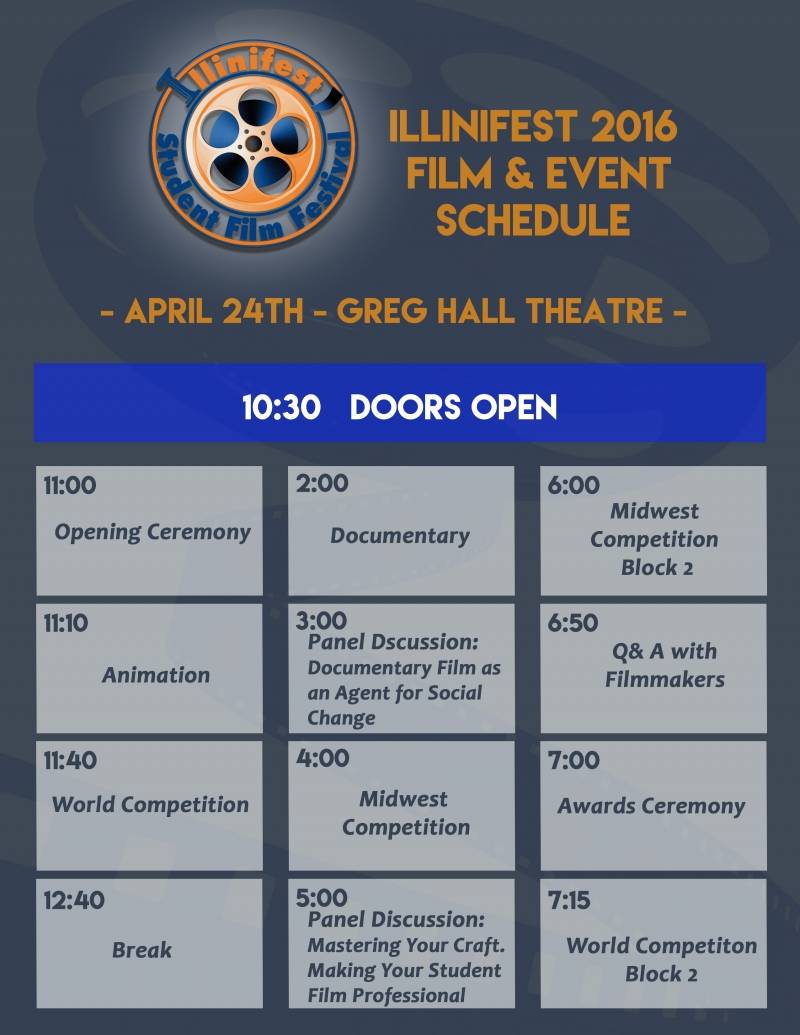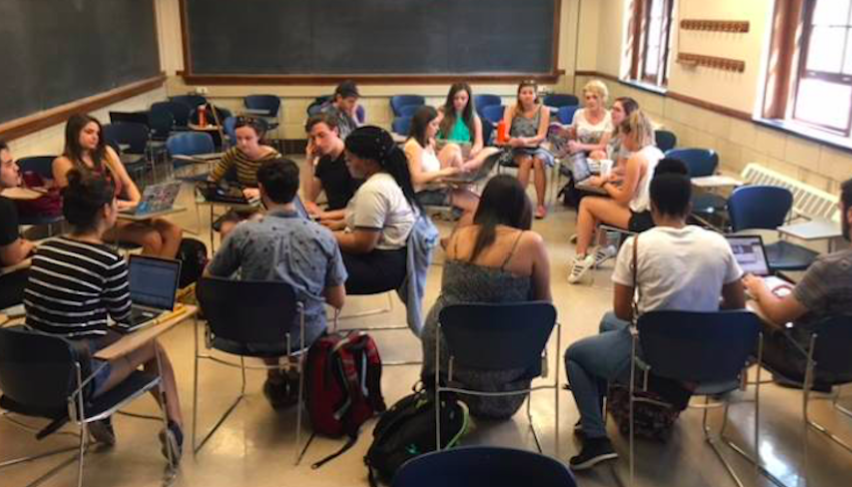How cool would it be to organize a film festival for college-credit? That’s exactly what the goal is for U of I’s class Media and Cinema Studies 464, aka Illinifest Student Film Festival. The class’ focuses on learning about film festivals throughout the world while also organizing a student-run film festival right on campus. This celebration of student and professional short-filmmaking is open to all genres, themes and categories. This year it received 123 short-film submissions from over 20 countries. I talked to this year’s class instructor Dora Valkanova and some of her students about how the fest has grown, as well as what to expect from 2016’s submissions.
SP: What has been your experience as class instructor for this event? What has been the most enjoyable and most difficult part of planning the festival?
Dora Valkanova: Teaching this course has been a great experience. It is designed to offer opportunities for students to combine their critical thinking and problem solving skills in order to envision and execute an event centered on a shared cinema experience. This is my second year teaching the course and last year the most enjoyable part was at the end of the semester when after the festival, students looked back and realized what they had accomplished. They talked in class about feeling proud of what they had achieved and that was immensely fulfilling. It is also great to observe students take ownership of the festival and make it something that’s theirs. The most difficult part is, what many educators face: ensuring that the course structure is in place for each class of students to step in and make this festival their own.
(Pictured below: the Illinifest 2015 team)

SP: The festival has undergone various title changes since its inception, with the title being Illini Independent Film Festival in 2013 and Etcfilmfest in 2014. Is the current title here to stay? In addition to these name changes, how else has the film fest evolved since the beginning?
Valkanova: The current title will stay for a while. The goal is to establish recognizability on campus and within the Champaign-Urbana community. I am the third instructor to teach an edition of this course that organizes a festival following Rich Potter and Alex Mobley. The two of them laid the groundwork and current versions of the course and the festival build on their work and input. The evolution of the film festival has followed the evolution of film technology in the last few years. Rich Potter mentioned that in 2013 they received submissions on DVD in the mail. That was three years ago. The class offered it as an option last year but no filmmaker opted to send a DVD of their film. Everything was handled digitally. This year the question of accepting submissions on DVD via mail did not even come up. There was an unspoken understanding that everything would be done via online file sharing.
SP: Last year, the fest had 60 submissions; this year, there are over 100. How have you focused on reaching more people? Is growth largely domestic or international?
Valkanova: Growth is both domestic and global. Last year the festival was focused on student filmmakers in Illinois. This year’s class wanted to expand that focus to include student filmmakers in the Midwest. They created a webform on their website and emailed that webform to Media and Cinema Studies Departments in schools all over the Midwest. That’s the category that has most awards and prizes. They also used an internet platform — Film Freeway — through which they received submissions from all over the world. Originally the World Competition section was not a competition — they did not plan on giving awards to films in it. Upon viewing the submissions, however, they decided that they had some very deserving films that needed to be recognized so they added a Best Picture World Cinema award in that section.
SP: Now that the fest has been established in the C-U area, how have you seen it contribute to the community and also to the students who are running it?
Valkanova: The long-term vision for the festival is informed by the intellectual tradition of the Department of Media and Cinema Studies at the College of Media, which emphasizes critical thinking skills necessary for a robust understanding of media and cinema content, production, and technology. In class, we discuss film festivals as cinematic events, at which film can be used as a medium for addressing broader questions with social and political relevance. We saw that with Sundance where school shootings emerged as a theme in this year’s program as well as the Berlinale, which put the spotlight on Europe’s migrants crisis. It would be great if Illinifest can become a film festival where film can animate broader conversations concerning not only campus life but also those taking place on city, state, and global level. The World Competition certainly opens that possibility. Of course, this long-term vision is balanced every year against what students imagine and want the festival to be. On the level of film craft, it is conceived as an event through which student and professional filmmakers can connect, see each other’s work, start new friendships and hopefully collaborate in the future.
SP: What kinds of trends, genres, and themes have you seen in this year’s submissions?
Janjay Knowlden: I’ve seen a lot of quality filmmaking across the board. Lots of films that push the boundary of comfort for the audience and also lots of fun films too.
Caitlyn Johnson: With this year’s submissions to Illinifest, there hasn’t be a general trend of one particular genre or themes but rather various groups of films that similarities in their thematic elements, especially in our Documentary category which are all very socially driven in their content. These documentaries include such thematic elements as prisoner restitution, controversial PTSD treatments, intersectionality between socio-economic status, class and personal ideologies. We will be discussing these topics in one of our two panel discussions, titled Documentary and Social Change 2:00pm at the festival.
SP: The description on the 2016 fest site says that you are accepting work in two categories: The Midwest Student category, which is open to students and recent grads from all over the Midwest, and The World Competition section, which is open to everyone from all over the country and globe. What kinds of differences have you seen between the two categories? Is one more submitted to than the other?
Janjay Knowlden: I’ve seen a lot of emphasis on nature in the World competition films and more urban, city locales in Midwest films.
Jeremy Marder: Our categories were expanded this year after an influx of submissions from countries such as Brazil, China, France and Russia. However, we see the two categories as being an extension of the same idea; to foster and exhibit student and global filmmaking to our community. The creation of the World Competition did not detract from the amount of films received in our Midwest competition. We are excited to showcase these compelling films at the festival, and we hope the community appreciates it as well.
Illinifest will be held Sunday, April 24th in Gregory Hall Theater (810 S Wright St). Doors open 10:30 a.m. The event is free and open to the public. For more information, please visit the official websites or check out the Facebook page.

All images courtesy Dora Valkanova
About Shelly Chang…
Shelly Chang is a Smile Politely writer for the Arts and Culture sections who drinks too much coffee and needs some book recommendations. Tweet her some @shellychangsp.









